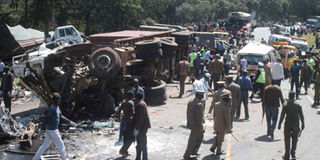How shady officialdom is causing deaths on Kenyan roads

Police and wananchi at the scene of an accident at Sachang’wan on the Eldoret-Nakuru highway on December 12. PHOTO | FILE | NATION MEDIA GROUP
What you need to know:
Kenya’s roads are some of the world’s most dangerous, and one cannot avoid thinking the worst when the most consistent item in the news, year in, year out, has been road accident fatalities.
In December last year, 70 people died within 72 hours in road crashes, and statistics from the Kenya National Bureau of Statistics show that 5,488 people died on the road in 2016.
Globally, Kenya has one of the highest road accident fatality rates, at 29 per 100,000 people.
Every time the average Kenyan boards a matatu, death or a lost limb are never far away. Kenya’s roads are some of the world’s most dangerous, and one cannot avoid thinking the worst when the most consistent item in the news, year in, year out, has been road accident fatalities.
In December last year, 70 people died within 72 hours in road crashes, and statistics from the Kenya National Bureau of Statistics show that 5,488 people died on the road in 2016. The National Transport and Safety Authority, however, puts the figure at 2,965, and 2,919 in 2017.
Globally, Kenya has one of the highest road accident fatality rates, at 29 per 100,000 people, and the World Health Organisation reports that more than twice the number of people die in road accidents in Africa than in the West.
The problem with Africa is that “infrastructural developments, policy changes and levels of enforcement have not kept pace with vehicle use”, says WHO. This means that the roads are not good enough, the policy or its implementation is weak, and law enforcement is asleep on the job.
SANITY
In a September 2003 gazette notice, the then Minister of Transport, the late John Michuki, announced a raft of laws that were aimed at bringing back sanity to the matatu industry. The highlights were that every passenger service vehicle (PSV) must be fitted with speed governors that capped speed at 80 kilometres per hour, have seatbelts for all passengers, and have a defined passenger capacity to prevent overloading.
They also required drivers to display their photo prominently in the matatu to curb “squad” driving, and made it mandatory for PSVs to have the ubiquitous yellow line that identifies them.
Fifteen years later, the laws seem to have been thrown out, wholesale. You would be lucky to find a working seatbelt, even in long-haul PSVs, and matatus have disabled their speed governors.
There have been other laws since Michuki’s. The Traffic Amendment Act of 2012, for instance, makes speeding punishable by the suspension of a driver’s license by not less than three years.
The Act also introduced a demerit points system where traffic offences committed by a driver are tracked through demerits recorded on the driving licence. For instance, driving while drunk attracts 14 demerit points; the points accumulate and the driver is punished according to how many points one has.
PUNISHMENT
Twenty or more points attract the stiffest punishment, where the driver is prohibited from holding a licence for two years.
Yet, despite all these laws, Kenyans keep dying on the roads. The police have long been blamed for aiding and abetting a system that keeps reckless drivers on the road, creating a cesspool where chaos reigns and the rule of law is negotiable, as long as you part with a bribe.

A mourner in Tingare, Siaya, pays her last respects to five family members who perished in a road accident that happened on December 23 at Sultan Hamud on the Nairobi-Mombasa highway. PHOTO | FILE | NATION MEDIA GROUP
Last week, a police officer in Narok County was caught on camera demanding a bribe, and the police service rushed to issue a statement firing him. But stakeholders say that the officer’s dismissal was just for show, and that the corruption is a culture so deeply embedded in the police service that it has become their primary business, prioritised above their law enforcement mandate.
Matatu Owners Association chairman, Mr Simon Kimutai, says the police are operating an extortion ring that exploits the entire transport industry and makes it impossible to maintain any form of safety regulations on the road.
“The minute a police officer stops you and demands that you produce your driving licence, he expects that hidden in the booklet will be a Sh50 or Sh100 bribe that determines how the rest of your interaction with him goes,” says Mr Kimutai. “Once he has the money, he doesn’t bother to perform any safety checks and will not even flag you for overloading, expired licenses or insurance stickers. You are free to go despite what faults you might have.”
IMPOUND VEHICLE
Should you refuse to pay, what follows is a procedure so hellish and expensive that most drivers would rather give that Sh100 and be on their way.
“The police operate on a “matatu haikosi makosa” mantra. If you don’t bribe them, they will impound your vehicle, make up charges against you if you are innocent, and drag you through a slow, arduous justice system that is rigged against you. You waste time in court, time you could have spent making money. Ultimately, the cost of justice is too much and most drivers would rather just bribe and get on with their lives,” says Mr Kimutai.
He places the blame on the transport rot squarely at the door of the authorities, sidestepping any questions that probe into the kind of responsibility that matatu owners might have.
Asked if matatu owners could avoid hiring repeat traffic offenders, he says: “We have no bureau that keeps track of PSV drivers and their records. Once they have the PSV licence, we entrust them with the vehicles and it is up to the authorities to keep them in check.”

This, however, fails to acknowledge that owners oftentimes pressure drivers to go on many trips so that they make more money at the end of the day.
A driver who spoke to us on condition of anonymity said what most owners care for is how much money the driver brings in, and that he is constantly under pressure to make as many trips as possible to make the most money.
BOOMING BUSINESS
“Owners know that business booms during the holidays so they pressure us to bring in a lot more money than we usually do. So we will stay on the road as much as possible, driving as fast as possible, making as much as we can. Very few matatu owners worry about vehicle safety or wear and tear, which is why we drive the way we do. There are no consequences,” he said.
Questions have also arisen over the quality of vehicles that are driven on the road. Matatu seats all feel relatively the same: small, hard, non-adjustable and without a working seatbelt.
Yet you deserve a better experience than that. A fabricator who spoke to us on condition of anonymity for fear of reprisals by the employer said that most buses on Kenyan roads run on modified truck rather than passenger chassis, and that while this does not necessarily compromise on safety, it certainly impacts on passenger comfort.
“Bus chassis have air suspension units which cushion the passengers against jolts and bumps on the road,” he said. “Truck chassis, on the other hand, use leaf springs which do the bare minimum in terms of enhancing comfort. So buses with these chassis are supposed to have additional support in the form of shock absorbers. If you feel every bump and pothole, then you are riding a truck chassis with no shock absorbers.”
The National Transport and Safety Authority in 2016 introduced new standards for vehicle construction of PSVs — KS372:2014 — which are supposed to ensure that PSVs are uniformly constructed, and that stringent safety measures, such as no roof luggage racks, 400mm passenger seats, safety belts and safety equipment like fire extinguishers and first aid kits, are complied with.
VEHICLE INSPECTION
For locally built buses, the construction process is overseen by the Kenya Association of Bus Manufacturers, which inspects and signs off at every stage of the construction. The final approval is given by NTSA.
However, lack of regular maintenance derails the gains made during vehicle production. Ideally, vehicles are supposed to be inspected annually by NTSA and issued with relevant certificates. This certificate of roadworthiness is what a police officer should look for once he stops a vehicle on the road. In case the NTSA or the police do not play their roles, rogue drivers can theoretically get away with driving unroadworthy vehicles.
However, a good bus body provides no protection against speeding, which makes crashes more severe due to the sheer velocity of the vehicle as it hurtles along the highway. The faster it is, the more braking distance and time it needs. In emergency situations, there is simply no allowance for extra time or distance, hence crashes occur.
TRAFFIC RULES
With little incentive to drive carefully and a law enforcement arm willing to look the other way for a few shillings, it seems that matatus are running this show, and they are willing to run it to the ground as they chase the bottom line. But it is unfair to put the blame sorely on PSVs, as private drivers are often just as complicit, breaking traffic rules with impunity and driving circles around the line between
For instance, people have created dedicated social media accounts that alert users of NTSA alcoblow checkpoints on the roads, enabling them to use alternative routes so as not to get caught driving while drunk. Obstinacy, incessant honking, overlapping and road rage are all common behaviour on the roads, and experts are scrambling to find out what it is about us that makes us act the way we do on the roads.
Mr Gidraph Wairire, a senior lecturer at the University of Nairobi’s sociology department, has a theory: “The value system of Kenyans disappears when they get behind the wheel. They are suddenly in a rush, rude, impatient and have no respect for other road users. This selfishness translates into bad road habits such as speeding, blocking lanes and recklessness, contributing to high rates of accidents.”
BAD BEHAVIOUR
He suggests that this is due to a collective loss of social control that gives way to bad behaviour.
“Social control is that instinct that makes us want to do the right thing even when an authority figure is absent. In Kenyan society, however, individual preferences or ego supercede common good, causing people to disregard rules. That is why so many are driving recklessly on the road,” he said.
Mr Wairire thinks that the problem can be fixed if good attitudes are taught from a young age.
“Teach children moral sensibility, responsibility and accountability. Teach them that we are safe-keepers of the laws of the land. That way, they grow up into conscientious adults who don’t need to be supervised,” he said.





